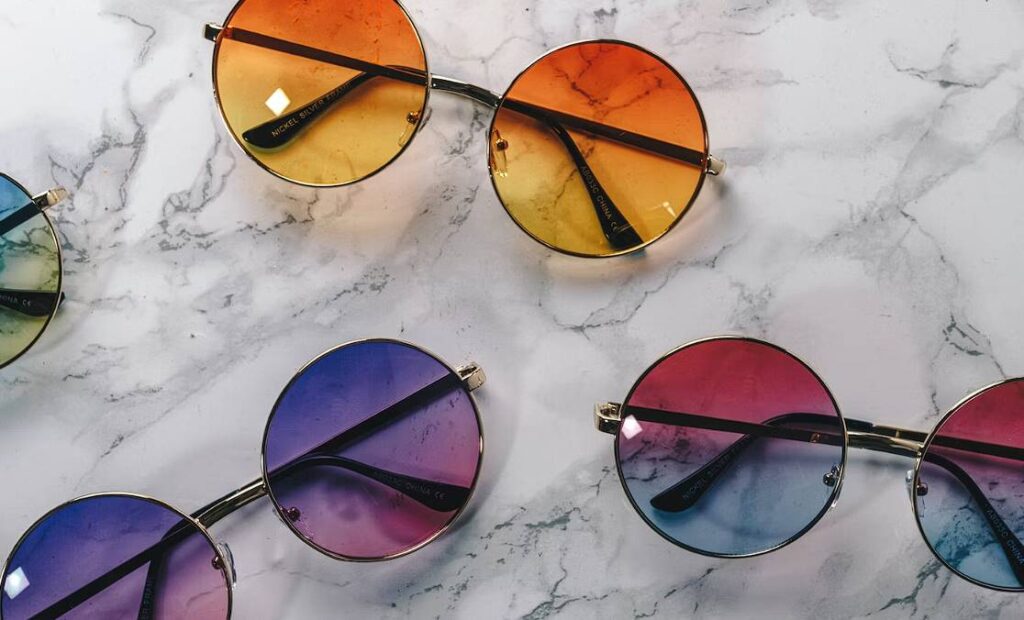Sunglasses protect our eyes from the sun's harmful ultraviolet (UV) rays, making them much more than fashion accessories. But you should know that not all sunglasses are created equal when it comes to quality and protection.
When looking for a new pair of sunglasses, it is essential to research to select a set that will protect your eyes from the damaging effects of the sun's rays.
This blog will go into detail on a variety of methods and criteria to help you evaluate the quality of sunglasses. If you're familiar with these techniques, you can confidently choose sunglasses that serve your fashion and eye health needs.
Let's look at how you can tell the quality of your sunglasses to make an informed decision the next time you go shopping.
What Qualifies As A Good Pair Of Sunglasses?
Sunglasses are essential for anyone concerned about their eyes being exposed to the sun's potentially damaging ultraviolet rays. Finding the ideal pair of sunglasses can be challenging due to the wide variety of brands, styles, and materials available.
Here, we'll break down what constitutes a high-quality pair of sunglasses and how to pick the right ones for your face shape and lifestyle. We'll delve into the significance of selecting a pair of sunglasses with an emphasis on environmental friendliness.

Find The UV Protection Label.
Reputable companies make the safest sunglasses for your eyes. As a result, the labels will always specify the degree of UV defence offered. There are two methods to find them: look for the 100% UV protection label or the UV filter category UV 400.
All ultraviolet radiation (UVA and UVB) up to and including 400 nanometers are effectively filtered out by sunglasses with UV 400 lenses. If you're in the market for wraparound sunglasses, the most important thing you can do to protect your eyes from the sun is to search for either of these labels.
Always Go For The Larger Size.
Sunglasses serve as a form of eyewear insurance. So, if you want more protection from the sun, go with larger lenses. As a result, you'll protect your eyes from unnecessary exposure. Sunglasses typically have larger lenses. Nonetheless, fashion occasionally pushes smaller lenses to the fore. Furthermore, fashions like this never last.
Avoid stressing over them. You feel more secure knowing that you have this product. Furthermore, it is not fashionable to seek out methods of safety. Choose a pair of oversized or wraparound glasses instead. These are useful for blocking the sun's rays from all angles.
Use A UV Flashlight To Check Your Sunglasses
How do you know if your sunglasses are polarised? A lot of people wonder about this. There is a straightforward at-home test. It's so absurd that it might work. The quality of your sunglasses can be checked with a household UV flashlight. Put a light on the banknotes and see how they hold up. Use your prescription sunglasses to block the light from the bill's watermark. UV protection can be assumed if it vanishes. It couldn't be easier!
The flashlight will emit visible light and UV light, which is invisible to the human eye. If you wear glass lenses, some intense light will enter and light up the paper. It is important to differentiate between the effects of direct UV light and those of light filtered through the lens before reaching the test subject.
It is important to keep in mind that an abnormality would exist if the lens of your sunglasses did not allow visible light to pass through it. In this scenario, you could not see anything at all through your sunglasses.
Check The Frames' Fit And Comfort.
Choosing the right frames requires thinking about how the glasses will fit and feel on your face. Good eyewear, prescription or sunglasses should feel secure on your face and provide adequate peripheral vision. Ensure the frames you pick are the perfect snug amount without being too loose. A frame that fits snugly will keep your glasses in place and allow you to see clearly.
Having a frame that fits well and is comfortable will also help you avoid the headaches and other discomforts that come with having to wear glasses. This highlights the significance of trying on potential frames to ensure a good fit and level of comfort.
Examine The Date Of Expiration.
Did you know that sunglasses have a shelf life? Indeed, they do! After two or three years, most sunglasses are past their prime and should be replaced. But why do sunglasses have a shelf life? With time, the lens' UV protection and unique lens coatings degrade from exposure to sunlight. This renders it completely ineffective.
Check The Lens Clarity.
When assessing its optical quality, examining the lens's central and periphery fields of view is necessary. There shouldn't be any blurriness or artefacts on the edges, and the centre should be crystal clear. To ensure that colours are rendered faithfully in your photographs, you should inspect them for chromatic aberrations, otherwise known as colour fringing around high-contrast edges.
Think About The Various Lens Materials Available.
There are a variety of lens materials to choose from, so it's important to do some research before buying new eyeglasses. The cost, durability, and comfort offered by various materials can vary widely. Polycarbonate, glass, and high-index plastic lenses are the most popular options.
The comfort and durability of your eyewear can be affected by the material they're made from. To help you make an educated decision when purchasing eyewear, this article will compare and contrast polycarbonate lenses with glass lenses.
Watch Out For Dark Sunglasses
It's a common misconception that sunglasses provide more protection from the sun the darker they are. The truth is that the darker the lens, the less likely it will effectively block UV rays. Even if the sunglasses are dark, if they do not have lenses that block out 100% of UV light, they will not be effective in protecting your eyes.
In order to reduce the effects of glare and outside light, dark, high-quality sunglasses are ideal. Dark sunglasses, however, cause your pupils to dilate, increasing the amount of light reaching your retinas. Without UV protection, your eyes are more likely to develop cataracts and macular degeneration from prolonged exposure to the sun. If you want to wear dark sunglasses, double-check that the lenses offer complete protection from ultraviolet light.
Check The Sunglasses' Coatings
Sunglasses are a must-have item for anyone who wants to shield their eyes from the sun's potentially damaging UV rays. However, only some pairs of sunglasses are the same.
Understanding the various lens coatings available on sunglasses is important because they can offer varying degrees of protection and comfort. In this piece, we'll look at how different lens coatings for sunglasses can help your vision and comfort. We'll also discuss polarised lenses and how they work to cut down on glare.
Nose Pads
Having a soft, comfortable nose pad on your glasses is important. The hard pads on some pairs of sunglasses are irritating. They also put stress on your nervous system. You should instead check the nose pads to see if they are bendable. Make sure the glasses are comfortable and do not cause any discomfort.
Look At A Variety Of Sunglasses
Sunglasses are necessary for any wardrobe, regardless of the time of year. Sunglasses are practical for more than just keeping the sun off your eyes; they can also be a stylish accessory. Looking at a variety of sunglasses can help you find the best pair for your face shape and personal taste.
There is a virtually infinite variety of sunglasses today, from retro wayfarers to cutting-edge rimless styles. If you look at a few different options, you should be able to find a pair of glasses that works well with your style and the contours of your face.
Understand Polarisation
The use of polarised lenses in sunglasses is on the rise. And with good reason, too! A polarising filter in a pair of glasses only allows light travelling in the vertical direction to pass through, while all other angles of light are blocked. In this situation, three things occur:
- Glare is reduced by using polarised lenses.
- They improve contrast.
- They enhance both visual clarity and comfort.
Polarised lenses are a useful extra layer of defence against UV radiation from the sun. Because of this, they make it possible to see better in bright sunlight, which is very helpful when driving or playing sports.
If you're in the market for new sunglasses, invest in a pair of polarised shades. However, in some instances, polarised lenses are not the best choice, and you should keep that in mind.
- Clocks
- LCD Screens
- Night Driving
- Instrument Displays
- Auto Dashboards
Consult An Optometrist.
You can take your sunglasses to the optical store closest to you to examine them to determine whether they are suitable for shielding your eyes from harmful radiation. Opticians and optometrists have the necessary equipment to evaluate your sunglasses and determine the material from which your sunglasses' lenses are constructed.
What Should You Look For When Buying High-Quality Sunglasses?
You're prepared to take things to the next level now that you know how to judge the quality of your sunglasses. In other words, you're prepared to go out and get a pair of beautiful and functional sunglasses that will provide maximum protection from the sun's potentially damaging UV rays, which can cause macular degeneration. Get ready for your next pair of eyeglasses purchases by reading this:
What Is The Appearance Of The Packaging?
Believe it or not, a product's packaging can reveal surprising information about it. Even though it is not the primary feature, it indicates the sunglasses' quality. Remember that the packaging has been the subject of careful consideration, planning, and execution by the designers and marketers in an effort to boost sales. The high-end brands are more refined and cutting-edge.
The packaging is a fine detail in identifying genuine sunglasses and any other designer product. High-quality packaging and extras like a case, pouch, or cleaning cloth are standard for the best sunglasses.
Each set of wooden sunglasses comes with a hard case, a vegan leather case, a linen pouch made from recycled materials, and a microfiber cloth for thorough cleaning.
Do The Lenses Have A High Quality?
Sunglasses' primary function is to shield one's eyes from the glare of the sun. Not going to lie: we wear sunglasses in part to make a fashion statement. You can still do so if your sunglasses have quality polycarbonate lenses.
UV400 polarised lenses and reflecting surfaces, which block out 100% of the sun's harmful ultraviolet radiation, increase contrast while doing away with all reflections and glare; Therefore, you don't need to worry about the quality of the sunglasses lenses you are purchasing.
What Materials Is The Frame Made Of?
High-quality frames produce long-lasting, high-quality eyewear. Therefore, when selecting a pair of sunglasses, paying attention to the frame material is crucial. Sunglasses may be constructed entirely of wood, metal, acetate, or a combination of these materials.
Sunglasses are constructed from premium acetate, stainless steel, and various types of veneer wood sourced from sustainable forests. The sweat and water resistance built into each pair of wooden sunglasses ensures they will last for years. In addition, each pair of sunglasses is made from scratch using components sourced in an ethical manner.
What Feel The Hinges Like?
Have you ever had hinges that squeak? If this is the case, it is an indication that the sunglasses were poorly manufactured. If the wands do not bend easily or smoothly, this is another sign that they are low quality. The hinges on luxurious sunglasses are often made of stainless steel, either in the form of a barrel or a spring. These hinges are extremely long-lasting and will provide the sunglasses with a higher-quality feel as well as a more comfortable fit overall.

How Important Is UV Protection?
Don't let the lens colour fool you; UV protection has nothing to do with how dark the lenses are. The colour and degree of tint on the lenses have nothing to do with their ability to block UV light; rather, the presence or absence of certain chemicals during production matters.
As stated on the packaging, sunglasses should block 99% or 100% of UV rays to protect your eyes. The term "UV absorption up to 400 nm" or UV400 can be found on some labels; this represents full protection from the sun.
When shopping for high-quality sunglasses, the most important thing you should be thinking about is how well they will protect your eyes from the damaging effects of ultraviolet (UV) light.
Conclusion
Sunglasses are more than just a fashion statement because they shield our eyes from potentially damaging ultraviolet (UV) radiation. Yet, not all sunglasses offer the same level of protection. It is important to do some homework and select the best sunglasses for your face and activities.
Search for "100% UV protection" or "UV 400" to locate the UV label indicating that the product is a UV filter. These shades are capable of blocking UV rays with a wavelength of up to 400 nanometers, even those with the highest possible destructive potential. Choose shades with bigger lenses if you need greater defence against the light.
Check the polarisation of your sunglasses with a UV lamp. The flashlight will both produce and emit visible light, as well as ultraviolet light. Differentiating between direct UV radiation and filtered light before it reaches the test participant is crucial.
Make sure the frames are a good fit for you. Good eyeglasses should fit snugly and not distort your peripheral vision in any way. Make sure there is just a bit of wiggle room in the frames but not too much.
Check the expiration date. Sunlight gradually degrades the UV protection and special lens coatings on most sunglasses, so they become useless after a certain amount of time.
Verify that there is no blurring of images caused by the lens. Check the sharpness, blurriness, and clarity of both the lens's core and peripheral viewing areas. Check for colour fringing or chromatic aberrations at high-contrast edges.
Think about the several lens materials to choose from. Lenses made of polycarbonate, glass, or high-index plastic are common choices. The materials used to construct eyewear can have an impact on how they feel and how long they last.
Don't ignore someone wearing dark glasses. The less likely it is that a lens would effectively block UV rays, the darker it is. While dark, high-quality sunglasses are good for blocking out glare and ambient light, they have the potential to enlarge the wearer's pupils, so increasing the quantity of light that reaches the retinas. Prolonged exposure to the sun without UV protection increases the risk of cataracts and macular degeneration in the eyes. It is essential that lenses in high-quality sunglasses provide 100% protection from UV rays.
Lenses with different coatings, including polarised lenses, offer variable degrees of security and comfort. Hard nose pads can be uncomfortable and put stress on the neurological system, so it's important to get one that's soft and comfy.
Sunglasses come in every imaginable form, from classic wayfarers to futuristic rimless frames. Finding the ideal pair is possible with some careful consideration of your face shape and aesthetic preferences. Polarised lenses are gaining popularity because of their many benefits, including the elimination of glare, the enhancement of contrast and visual clarity, and the prevention of eye damage from UV rays.
Look at the package of the sunglasses you want to buy to get an idea of their quality before you buy them. Typically, high-end products may include a case, pouch, or cleaning cloth in its package.
High-quality lenses with UV400 polarisation and reflective coatings will filter out the sun's dangerous UV radiation in its entirety. The best frames have a construction that combines wood, metal, and acetate. High-end sunglasses typically have stainless steel hinges because they are durable, lightweight, and easy to adjust.
It's not the lens's darkness that determines its UV protection, but rather the presence or absence of specific chemicals during manufacturing. To protect your eyes, your sunglasses should block at least 99% of UV radiation, with some labels even guaranteeing complete protection. The level of protection from ultraviolet (UV) light that the sunglasses offer is the most crucial factor to think about while searching for a good pair of sunglasses.
Content Summary
- Sunglasses are more than just fashion accessories; they protect our eyes from harmful UV rays.
- Not all sunglasses offer the same level of quality and protection.
- Research is essential when selecting sunglasses to ensure they protect your eyes effectively.
- This blog provides detailed methods and criteria to evaluate the quality of sunglasses.
- Understanding what qualifies as a good pair of sunglasses is crucial.
- Finding the right sunglasses involves considering face shape, lifestyle, and environmental friendliness.
- Look for the UV protection label on sunglasses to ensure they offer sufficient defence against UV rays.
- Larger lenses provide more protection, so opt for sunglasses with larger sizes.
- Use a UV flashlight to check if sunglasses are polarised and offer proper protection.
- Frames should fit well, feel comfortable, and provide adequate peripheral vision.
- Sunglasses have a shelf life of two to three years due to degradation of UV protection over time.
- Lens clarity is crucial, with no blurriness or artefacts and clear central vision.
- Different lens materials offer varying costs, durability, and comfort, such as polycarbonate, glass, and high-index plastic.
- Dark sunglasses do not necessarily provide more UV protection; look for 100% UV light blocking.
- Lens coatings affect protection and comfort, so it's important to understand them.
- Soft and comfortable nose pads are essential for comfort and avoiding irritation.
- Explore a variety of sunglasses to find the perfect pair for your face shape and style.
- Polarised lenses reduce glare, improve contrast, and enhance visual clarity and comfort.
- Polarised lenses provide an extra layer of defence against UV radiation.
- Consider clocks, LCD screens, night driving, and instrument displays when choosing sunglasses.
- Consult an optometrist to evaluate your sunglasses and determine the lens material.
- The appearance of packaging can indicate sunglasses' quality and high-end brands.
- High-quality lenses block 100% of harmful UV radiation and provide enhanced contrast.
- Frame materials affect the longevity and quality of sunglasses.
- Pay attention to the hinges, as poor-quality hinges may squeak or not bend smoothly.
- UV protection is crucial, regardless of the lens colour or degree of tint.
- Look for sunglasses that block 99% or 100% of UV rays and offer UV400 protection.
- The primary focus when buying high-quality sunglasses should be protecting your eyes from UV light.
Frequently Asked Questions
Polarised lenses are not a requirement for quality sunglasses, but they can significantly reduce glare and improve visual clarity, particularly in outdoor activities or when near water.
High-quality lenses are typically made from durable materials like polycarbonate or Trivex. Ensure the lenses are free from distortion and imperfections and offer clear, undistorted vision.
A proper fit is crucial for both eye protection and comfort. Look for sunglasses with adjustable nose pads and temples to ensure a secure and comfortable fit on your face.
Customer reviews can provide valuable insights into the performance and durability of sunglasses. However, consider a range of reviews to get a balanced understanding of a particular brand or model.
Price alone is not a definitive indicator of sunglasses' quality. While higher-priced sunglasses may often offer better craftsmanship and materials, it's essential to consider other factors like UV protection, lens quality, and brand reputation.





